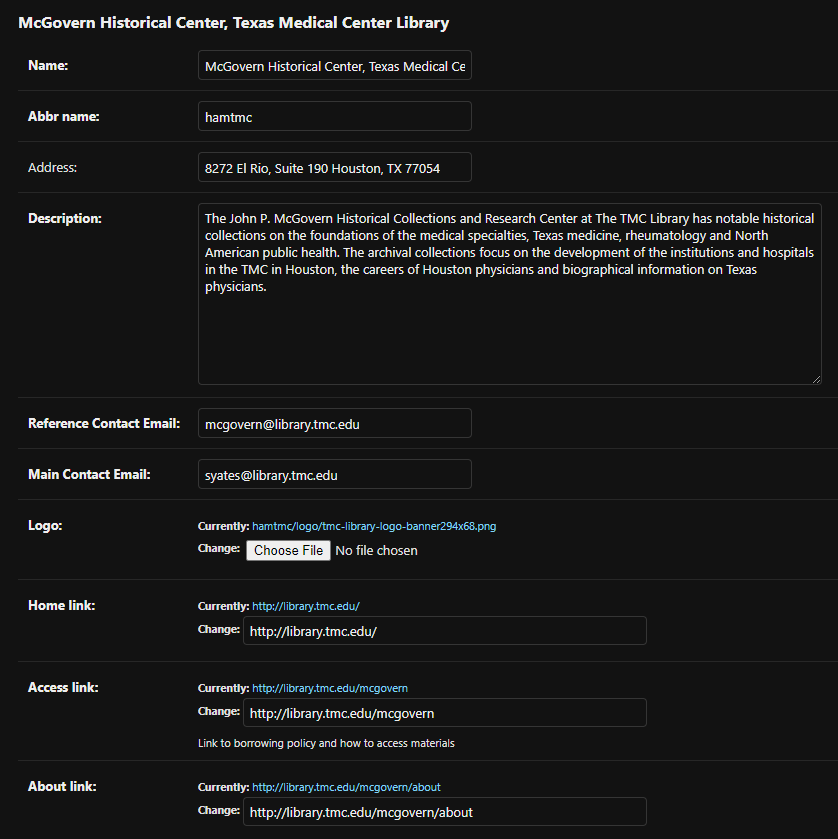TARO Repository Contacts
You may have recently received an email from one of your friendly neighborhood TARO Steering Committee members confirming your repository contact information and asking about your current level of engagement with TARO. If you’ve replied—thanks, it was great to hear from you! If you haven’t, please take a moment to search your inbox, dig out that TARO message, and shoot us a quick response.
Most TARO communications are shared here on TARO Today (sites.utexas.edu/taro/) and the TARO listserv (taro-lib@utlists.utexas.edu). Anyone working at a member repository is encouraged to join the listserv (not just the primary repository representative). Occasionally, however, TARO may need to communicate directly with repository representatives, so it is important to keep this list up to date.
On that note, we also encourage members to keep their repository page on the TARO Administrative website up to date so that users have access to the most current information. If you have any questions on how to do this, email matt.richardson@library.tmc.edu and I’ll walk you through.
TARO Brown Bag at the Society of Southwest Archivists Annual Meeting, May 3
TARO will be hosting its annual Brown Bag session during the Society of Southwest Archivists Annual Meeting. The meeting is virtual and the Brown Bag takes place during the lunch hour Friday 12-1:15pm. TARO members, prospective members, and all finding aid afficionados are encouraged to come to learn about TARO happenings and how to get involved.
TARO In-Person Workshops
TARO recently hosted two in-person “Introduction to TARO: Encoding and Submitting Finding Aids” workshops: at Lamar University in Beaumont on February 26 and at UT Tyler on March 4. These trainings were funded by the Texas Historical Records Advisory Board. Thanks to THRAB, our trainers, and attendees!
There aren’t currently any more in-person workshops planned for 2024, but plans are being made for future training opportunities. If you have ideas, see a need, or are interested in hosting a training for your region, please let us know!
TARO Today revisions
We continue adding to, updating, and re-organizing pages on TARO Today. Recent additions include a “Why TARO?” page to support member advocacy and a page for our 2022-2025 Strategic Plan, TARO Today | TARO Tomorrow. Another highlight is a dedicated page to feature the TARO Best Practices Guidelines and XML Template more prominently.
2024 Committee Charges
At the beginning of 2024, the Steering Committee reviewed the Strategic Plan to create charges for each of the committees to pursue this year. These charges are being communicated to committees, so stay tuned as work gets underway.
Call for Committee Participation
As the TARO Steering Committee rolls out the 2024 committee charges, we’re looking for folks to help move things forward. New members are welcome on all committees, even if you don’t have much experience with TARO or encoding finding aids. With the website redesign behind us and new projects about to get underway, now’s a great time to get involved!
In addition to volunteers for committee roles, TARO is seeking new Co-Chairs for the Standards Committee and the Website & Technology (Web/Tech) Committee, as well as an additional Co-Chair for the Outreach and Education Committee. Please email matt.richardson@library.tmc.edu if you have questions or are ready to sign up!
EAD4 Draft and Call for Feedback
Our final update comes to us from the Society of American Archivists’ Technical Subcommittee on Encoded Archival Standards (TS-EAS). A draft revision of EAD has been released for public comment. Changes to the EAD standard would (eventually, likely) impact TARO as well as individual member repositories, so members are strongly encouraged to share their feedback with TS-EAS (email: ts-eas@archivists.org).
The first draft of EAD 4.0 has been published as of last week and will be kept open for community feedback until the end of July. To make sure that the updated version of EAD fits our community’s requirements and that the benefits of a new version of EAD outweigh the challenges of transitioning from one version to another, the members of the EAD sub-team want to hear your comments, questions, suggestions, and concerns about EAD 4.0. You can provide feedback via GitHub or the TS-EAS email, ts-eas@archivists.org. We will also offer several informal drop-in sessions online between April and June to discuss and ask questions, starting with an introductory session on how to contribute to the call for comments this week Wednesday, April 24, 4pm UTC (open for registration). We are not doing this work alone!
For more, see their recent blog post on the SAA Description Section blog: https://saadescription.wordpress.com/2024/04/22/shape-the-future-of-ead-a-call-to-action-part-ii/

